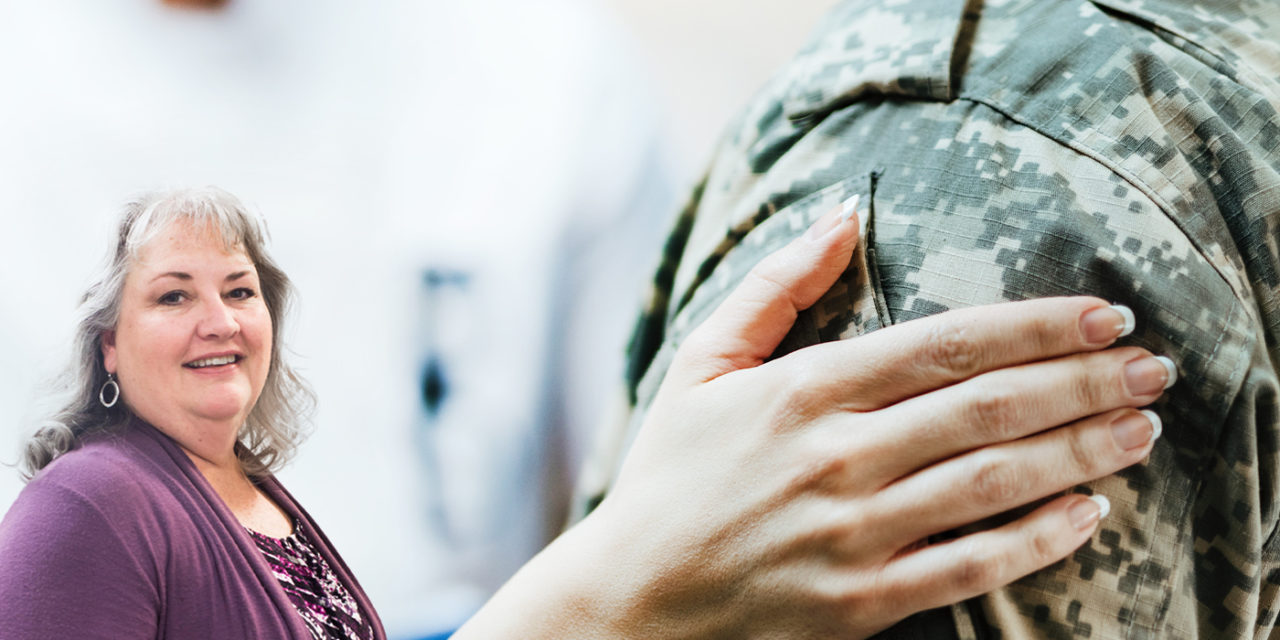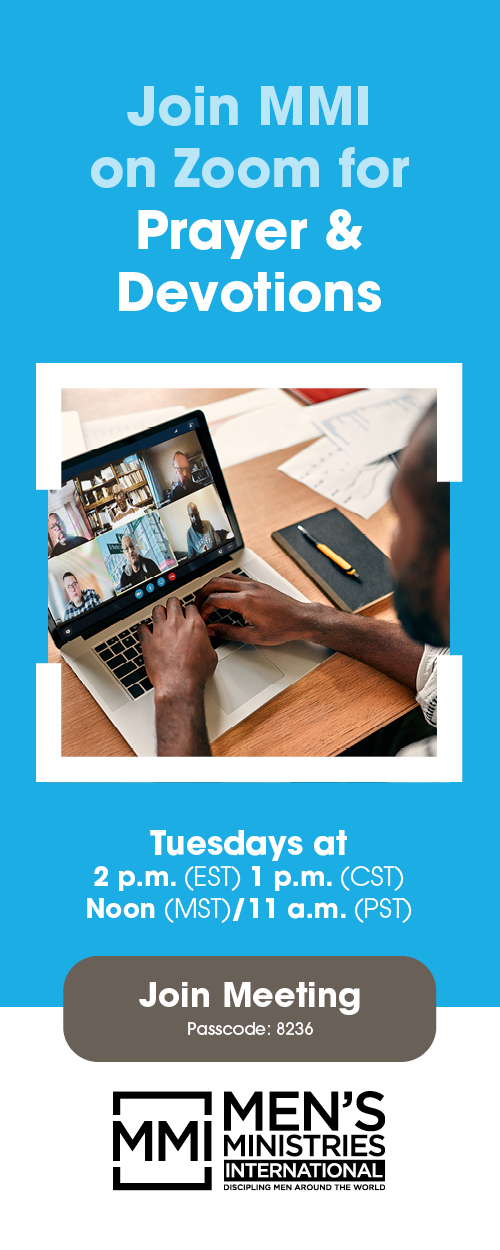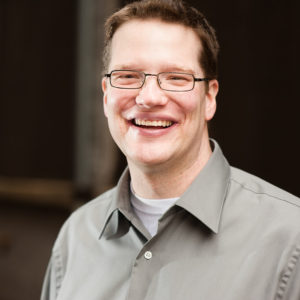
Jeff Finley
Light + Life Executive Editor
Jeff Finley is this magazine’s executive editor. He joined the Light+Life team in 2011 after a dozen years of reporting and editing for Sun-Times Media. He is a member of John Wesley Free Methodist Church where his wife, Jen, serves as the lead pastor.
by Jeff Finley
The Rev. Cheri Coleman is an award-winning chaplain who serves military veterans, trains colleagues, and chairs the Free Methodist Church in Southern California’s Ministerial Education and Guidance Board, but she didn’t initially plan on becoming an influential chaplain or a denominational leader.
During the 1990s, she was a busy mother of five children when she enrolled in Fuller Theological Seminary “for self-care. I had five kids at home and needed something that was just for me,” Coleman said in an interview with Light + Life. As she took Clinical Pastoral Education (CPE) classes designed for future chaplains, she “fell in love with it” and realized “I was created to do this.”
As she pursued a Master of Divinity degree from Fuller, her family connected with a Free Methodist congregation.
“At that same time, we had landed at Cucamonga Christian Fellowship in Rancho Cucamonga,” she recalled. “They ordained women, so I learned more about the Free Methodist Church. As I was going through CPE and finishing up at Fuller, everything kind of came together.”
She interned for a couple of years at her home church doing pastoral care while in seminary. She then graduated from Fuller and became an ordained Free Methodist elder, but her training was not finished.
“I went back into CPE to become an educator — a supervisor — so that was another six or seven-year process,” she said. “Not only am I a chaplain, which I love, I also train chaplains.”
Among the many chaplains receiving her training are several Free Methodists who have also benefited from her expertise in “walking with people in the midst of crisis” and answering their questions about “where is God in the midst of it.” Through chaplaincy, she realized, “my joy met the world’s need in that place where I could be the hands and voice to communicate God’s presence and God’s love.”
Coleman was one of four recipients of the Free Methodist Chaplains Association’s Distinguished Service Medallion as the chaplains met Aug. 24–27 at the Navigators’ Glen Eyrie Conference Center in Colorado. Other 2021 recipients include Chaplains Tim Porter, Jon Wright and Larry Taylor.
According to Chaplain Ministries Co-Director Patricia Porter, Coleman is the only Free Methodist chaplain serving as a CPE supervisor and also “is the first woman to receive the medallion in the Southern California Conference and fourth woman to receive the Medallion nationwide.”
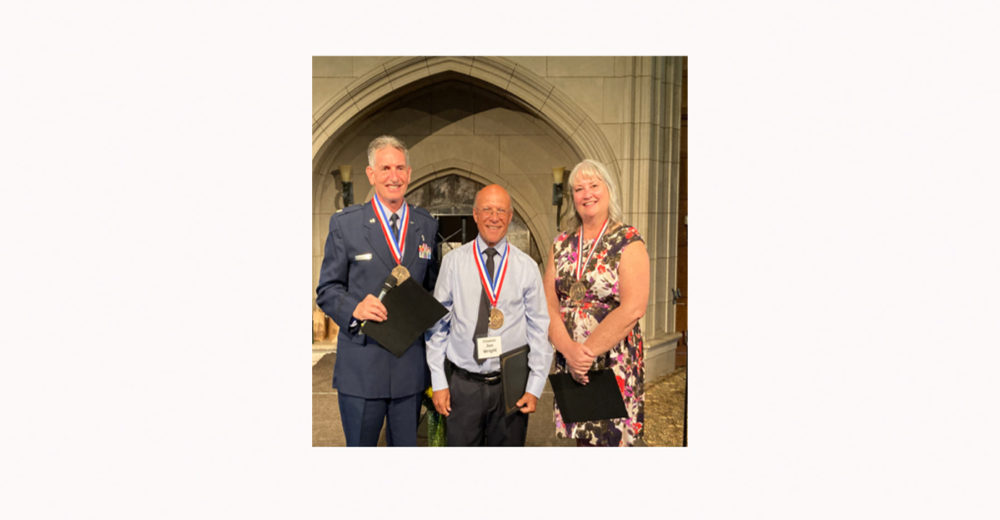
Chaplains Tim Porter (left), Jon Wright (center), Cheri Coleman (right) have their photograph taken after receiving the Distinguished Service Medallion at the August conference of the Free Methodist Chaplains Association. Not pictured is Chaplain Larry Taylor who also received the Distinguished Service Medallion.
Coleman — an ordained Free Methodist elder — appreciates the validation and connection provided by the association.
“One of the things that’s needed beyond being ordained if you want to become a board-certified chaplain is you have to be endorsed. The endorsing agent or the endorsing body is part of the Free Methodist Chaplains Association. You can’t become an endorsed chaplain or, therefore, board-certified unless you’re part,” she explained. “There’s also great fellowship. There’s support.”
She added that the association’s annual gatherings provide both camaraderie with peers and professional development with speakers who share updates about what’s happening in chaplaincy. The association includes military, hospital, hospice, skilled nursing facility, prison and school chaplains.
“A lot of people think that chaplains just go pray at the bedside, and there’s so much more than that,” she said.
Serving Veterans and Training Others
Coleman has been a chaplain for 21 years. Eight years ago, she learned of a hospital chaplain opening in the Veterans Affairs Loma Linda Healthcare System that would allow her to start a program to train other chaplains.
“I’d finished all my training, and it was closer to home, and people were encouraging me to get out there and start my own program,” said Coleman, who added that because her grandfathers were veterans, she had endured frightening experiences at another VA hospital as a child, “I thought, ‘There’s no way I’m going to be at the VA. The VA’s a scary place.’ But then I felt like God really challenged me … ‘So you haven’t grown up enough in 30 years to be able to at least consider this?’”
She went ahead and toured the hospital, and it became obvious to her that she could be used by God to minister to the veterans.
“The veterans are really, for the most part, fantastic, and so I changed,” said Coleman, who acknowledged the transition wasn’t easy. “It was really a difficult change in those first six months, and I wasn’t sure I would be able to stay, because there was just so much secondary trauma that I was receiving by hearing a lot of Vietnam stories from the veterans.”
She experienced secondary post-traumatic stress disorder as she repeatedly heard the veterans’ stories. At times, she felt distant from God as she encountered the suffering in the world, but she realized “God had not left the building, and that helped me to get some trauma-specific therapy.” Along with therapy, she said she benefited from “spiritual direction, my own spiritual practices, worship and prayer, and leaning into my community.”
Even with those practices and “pulling out every self-care tool that I had, it took maybe six months to get to the point where I didn’t feel so vulnerable. Secondary PTSD is also known as vicarious trauma.”
She shared her experiences with a psychologist, a therapist, her pastor and CPE educator colleagues whom she credited with “walking with me in a dark time.” After she started the program to educate other chaplains, she had additional periods of space between hearing the veterans’ traumatic stories.
Despite at least one women serving as a chaplain during the Civil War, the first female military chaplain was not officially commissioned until 1973, according to an article by Megan Doyle of the U.S. Army Chaplain Corps. Veterans from more recent wars and conflicts, such as Operation Enduring Freedom and Operation New Dawn, have had more frequent interactions with female chaplains than veterans of the past.
“There are more and more female chaplains now serving,” Coleman said.
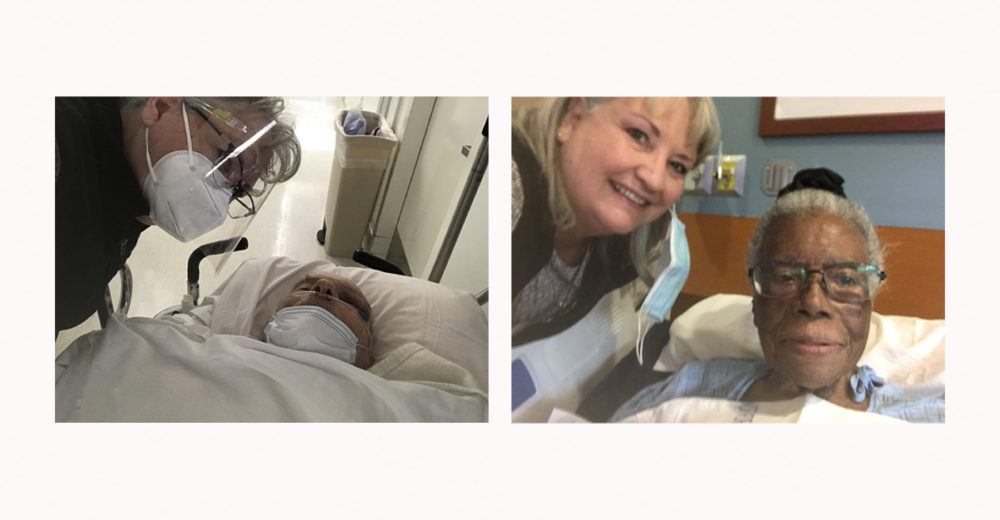
Care Amid COVID
Like other medical centers, the Loma Linda VA Hospital was not immune to a surge in patients from the COVID-19 pandemic. Cases have recently declined, but the hospital created COVID isolation units because of the highly contagious nature of the virus. The hospital also brought in mobile morgues because of several times the normal number of patient deaths.
“It was traumatic for the staff. It was traumatic for families because they weren’t able to see their loved ones, or if they were, it was just at the very last minute,” Coleman said.
The pandemic also has impacted her family professionally and personally. Her stepmother died from COVID-19 last December, and Coleman has a daughter who is an intensive care unit nurse and a son who works in a community hospital that experienced a high number of cases.
Tensions remain high in the medical field as some remain unvaccinated. Coleman noted that churches also are experiencing the same pandemic-related division taking place in their communities.
“Sometimes it’s gotten ugly with broken relationships because ‘you don’t have it,’ or ‘you do have it,’ or ‘I can’t be with you anymore,’” she said. “I think we’re just barely starting to see the tip of the iceberg of how COVID has impacted and will impact the church, the communities, our families, the world.”
In the midst of the tremendous loss caused by the pandemic, Coleman has found some additional time for reflection.
“COVID has really kicked me down to a lower gear, which I’ve been grateful for,” she said. “Although I’ve gone to work every day — I haven’t been somebody who’s been able to work from home — being home in the evenings, not having other things, has helped reset my whole system and how I’m coming at things because there’s just not time or energy — physical, emotional or spiritual energy — to do everything.”
The Free Methodist Way
The Free Methodist Church’s core values include life-giving holiness, love-driven justice, Christ-compelled multiplication, cross-cultural collaboration and God-given revelation. Coleman has experienced the interconnected nature of these values through her service to the church at the local, conference and national levels where she has repeatedly advocated for greater gender, racial and economic diversity in leadership.
“Holiness is obviously a lifetime pursuit. I love that [John] Wesley was talking about perfection, but it was being perfected in love — being perfected in love of God and love of neighbor, and who is my neighbor? Anybody who’s outside my house, whether in Rancho or Budapest, is my neighbor. God loves all of these people,” Coleman said. “God calls us to take care of the poor. God calls us into the margins. God’s way is different. It’s not about me and my choices. It’s about what benefits the whole — benefits all of the people God loves.”
She previously served a four-year term on the national Board of Administration and currently serves on the planning team for Our Story — a Free Methodist before the Wesleyan Holiness Women Clergy’s [Her]Story conference in March 2022. (Click here to register for Our Story.)
“Being able to go to the holiness conference and being supported to be able to do that is a great benefit to all of our women,” said Coleman, who has attended two of the previous conferences. “I was very impressed with how it was run, the level of professionalism and relevance to ministry … very current and very applicable.” She appreciated the opportunity to hear from “top leaders across other holiness traditions” while “feeling seen and known and embraced and challenged.”
Coleman said that Free Methodists should “more fully live into the fullness of who we are as a denomination of wholeness and holiness” and “reach out, look out and move out to be the hands and feet of God in the world. Everybody can do that whether it’s a hospital or your neighborhood or a school or the church building and to live out the kingdom values of ‘everybody gave and nobody had need,’ to pray and visit the sick and those in prison, to take care of widows and orphans. That is on God’s heart every minute of every day.”
Click here for the Free Methodist Church in Southern California’s celebration of Coleman’s distinguished service.
+

Jeff Finley
Light + Life Executive Editor
Jeff Finley is this magazine’s executive editor. He joined the Light+Life team in 2011 after a dozen years of reporting and editing for Sun-Times Media. He is a member of John Wesley Free Methodist Church where his wife, Jen, serves as the lead pastor.

